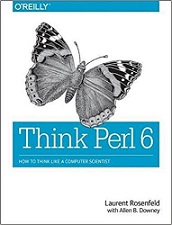
|
FreeComputerBooks.com
Links to Free Computer, Mathematics, Technical Books all over the World
|
|
- Title: Think Perl 6 (Raku): How to Think Like a Computer Scientist
- Author(s) Laurent Rosenfeld, Allen Downey
- Publisher: O'Reilly Media; 1 edition (June 2, 2017); eBook (2nd Edition, Creative Commons Licensed, 2020)
- License(s): CC BY-NC 4.0
- Paperback: 466 pages
- eBook: PDF (431 pages)
- Language: English, Spanish
- ISBN-10 1491980559
- ISBN-13: 978-1491980552
- Share This:

|
Want to learn how to program and think like a computer scientist? This practical guide gets you started on your programming journey with the help of Perl 6 (Raku), the younger sister of the popular Perl programming language. Ideal for beginners, this hands-on book includes over 100 exercises with multiple solutions, and more than 1,000 code examples so you can quickly practice what you learn. Experienced programmers - especially those who know Perl 5 - will also benefit.
Divided into two parts, Think Perl 6 starts with basic concepts that every programmer needs to know, and then focuses on different programming paradigms and some more advanced programming techniques. With two semesters’ worth of lessons, this book is the perfect teaching tool for computer science beginners in colleges and universities.
- Learn basic concepts including variables, expressions, statements, functions, conditionals, recursion, and loops
- Understand commonly used basic data structures and the most useful algorithms
- Dive into object-oriented programming, and learn how to construct your own types and methods to extend the language
- Use grammars and regular expressions to analyze textual content
- Explore how functional programming can help you make your code simpler and more expressive
- Laurent Rosenfeld has been a software engineer for about 20 years, working especially as a contractor for one of the largest telecommunication operator in Europe, particularly in the field of mobile networks. Over the last few years, he has been working especially in the fields of data migration, data quality, and data munging. He has written a number of tutorials on Perl 5 and Perl 6.
- Allen Downey is a Professor of Computer Science at Olin College of Engineering. He has taught at Wellesley College, Colby College and U.C. Berkeley. He has a Ph.D. in Computer Science from U.C. Berkeley and Master's and Bachelor's degrees from MIT.
- Raku Programming
- Perl Programming
- Introduction to Computer Science
- Regular Expressions
- Unix/Linux Shell Programming
 Similar Books:
Similar Books:
-
 Raku One-Liners (Andrew Shitov)
Raku One-Liners (Andrew Shitov)
In this book, you will find a lot of short programs, so short that they can be written in a single line of code. The seven chapters will guide you through Raku's syntax elements that help to create short, expressive, but still useful programs.
-
 Raku Guide (Naoum Hankache)
Raku Guide (Naoum Hankache)
This book is intended to give you a quick overview of the Raku programming language. For those new to Raku, it should get you up and running. Gain the skills to begin developing Raku applications from the ground up in this hands-on compact book.
-
 Perl 6 (Raku) at a Glance by Andrew Shitov
Perl 6 (Raku) at a Glance by Andrew Shitov
This book is about Perl 6 (Raku), a programming language of the Perl family. It covers many basic and in-depth topics of the language and provides the initial knowledge you need to start working with Perl 6.
-
 Using Perl 6 (Raku) by Jonathan S. Duff, et al
Using Perl 6 (Raku) by Jonathan S. Duff, et al
This book is primarily for people who want to learn Perl 6 (Raku). It teaches the basics from a Perl 6 perspective, touching on variable interpolation, datastructure use, object construction, threads, closures, symbol tables, and other core features.
-
 Higher-Order Perl: Transforming Programs with Programs
Higher-Order Perl: Transforming Programs with Programs
This is a book written with the goal to teach Perl programmers with a strong C and Unix background how to use techniques with roots in functional programming languages like Lisp that are available in Perl as well, but less known.
-
 Beginning Perl (Simon Cozens)
Beginning Perl (Simon Cozens)
The book promotes the use of Perl as a programming language, encouraging the creation of legible and sensible programs so as to dispel the image of Perl as a confusing and obscure language.
-
 Modern Perl (chromatic)
Modern Perl (chromatic)
Describe how experienced and effective Perl 5 programmers work. They use language idioms. They take advantage of the CPAN. They're recognizably Perlish, and they show good taste and craftsmanship and a full understanding of Perl.





